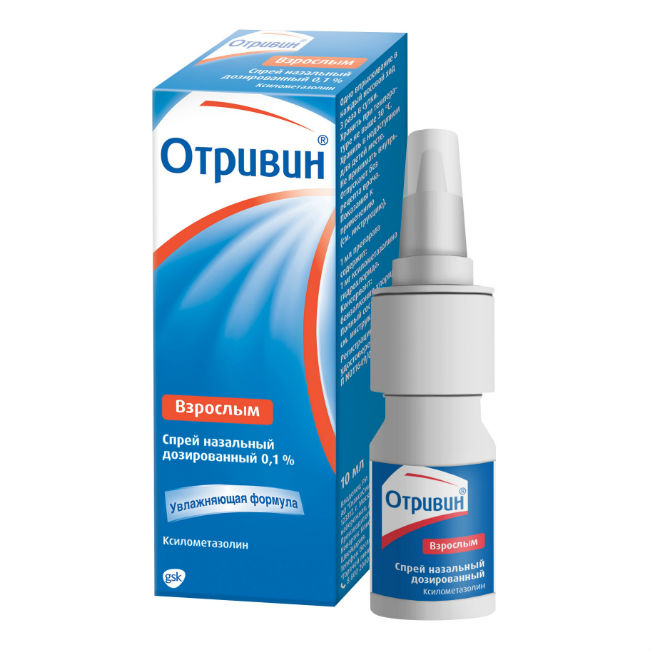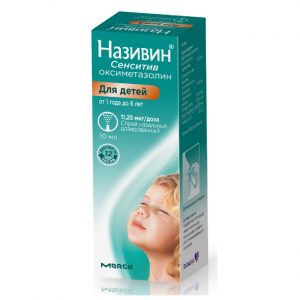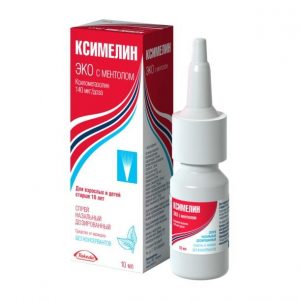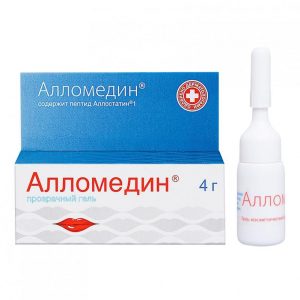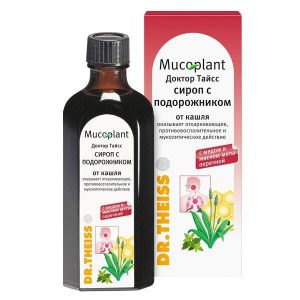Description
Briefly about the product
Otrivin nasal spray dosed 0.1%.
Moisturizing formula reduces symptoms of irritation and dryness of the nasal mucosa.
Relieves nasal congestion after 2 minutes, maintaining the effect up to 12 hours *.
* Instruction for medical use, RU No. Ñ N011649 / 04 of 09/10/08
Description
Nasal spray dosed 0.1% in the form of a clear, colorless solution, practically odorless.
Latin name
Otrivin
Release form
10 ml – bottles of high density polyethylene (1) with a pump-operated dosing device – packs of cardboard.
Pharmacological action
Xylometazoline has an alpha-adrenomimetic effect: it causes narrowing of the blood vessels of the nasal mucosa, eliminating edema and hyperemia of the mucous membrane of the nasopharynx. Xylometazoline also reduces concomitant hypersecretion of mucus and facilitates drainage of nasal passages blocked by secretions and, thus, improves nasal breathing with nasal congestion.
Otrivin ® is well tolerated by patients with sensitive mucosa, its effect does not interfere with the separation of mucus. Otrivin ® has a balanced pH value characteristic of the nasal cavity.
Menthol and eucalyptol contained in the preparation have a cooling effect on the nasal mucosa, giving a feeling of freshness.
In therapeutic concentrations, the drug does not irritate the mucous membrane, does not cause hyperemia.
Action occurs 2 minutes after administration and lasts for 12 hours.
In vitro studies have shown that xylometazoline in humans suppresses the infectious activity of rhinovirus that causes the common cold.
Indications
Acute respiratory disease with rhinitis (runny nose)
acute allergic rhinitis, hay fever, sinusitis, eustachitis, otitis media (to reduce swelling of the nasopharynx)
preparing the patient for diagnostic procedures in the nasal passage.
Contraindications
Hypersensitivity to the components of the drug
arterial hypertension
tachycardia
severe atherosclerosis
glaucoma
atrophic rhinitis
hyperthyroidism in children 6 years old surgical procedures
Used with caution in patients with diabetes mellitus, cardiovascular diseases, with increased sensitivity to adrenergic drugs, accompanied by symptoms of insomnia, dizziness, cardiac arrhythmia, tremor, high blood pressure.
Use during pregnancy and lactation
The drug should not be used during pregnancy.
During lactation, use is possible only under the supervision of a doctor and after a careful assessment of the risk-benefit ratio for the mother and the fetus.
Do not exceed recommended dose.
Special instructions
Not recommended for continuous use for more than 10 days.
Do not exceed recommended doses, especially in children and the elderly.
Prolonged (more than 10 days) or excessive use of the drug may cause a rebound effect (drug rhinitis).
Composition
1 ml contains:
Active ingredient:
Xylometazoline hydrochloride 1 mg.
Excipients:
Sodium dihydrogen phosphate dihydrate
Sodium hydrogen phosphate dodecahydrate
Sodium chloride
Benzalkonium chloride (in the form of a 50% solution)
Sorbitol 70%
Disodium edetate
Levolentol
Dosage and Administration
Intranasally.
Adults and children over 12 years of age – 1 injection in each nasal passage 3 times a day.
Do not use more than 3 times a day.
side effects
Determination of frequency of adverse reactions: very often 10) often ( 1/100, <1/10) infrequently ( 1/1000, <1/100) rarely ( 1/10 000, <1 / 1000) is very rare (<1 / 10,000). From the immune system: very rarely – hypersensitivity reactions (angioneurotic edema, rash, itching). From the nervous system: often – headache rarely – insomnia, depression (with prolonged use in high doses). From the organs of the senses: very rarely – a violation of the clarity of visual perception. From the cardiovascular system: rarely – palpitations, elevation of blood pressure very rarely – tachycardia, arrhythmia. From the respiratory system: often – irritation and / or dryness of the nasal mucosa, burning, tingling, sneezing, hypersecretion of the nasal mucosa. From the digestive system: often – nausea rarely – vomiting. Local reactions: often burning at the site of administration. If any of the above side effects are exacerbated, or the patient has noticed any other side effects, he or she should tell the doctor. Drug Interaction Xylometazoline is contraindicated in patients receiving MAO inhibitors at the present time or receiving them within the previous 2 weeks. Concomitant use of tri- or tetracyclic antidepressants and sympathomimetic drugs may increase the sympathomimetic effect of xylometazoline, so it is recommended to avoid such a combination. Overdose Symptoms: xylometazoline, when applied locally in excessive doses or if taken orally, can cause severe dizziness, increased sweating, a sharp decrease in body temperature, headache, bradycardia, increased blood pressure, respiratory depression, coma and cramps. Following an increase in blood pressure, a sharp decrease can be observed. Treatment: appropriate supportive measures should be taken in case of any suspicion of an overdose, in some cases immediate symptomatic treatment is indicated under the supervision of a doctor. These measures should include monitoring the patient for several hours. In case of severe poisoning with cardiac arrest, resuscitation should last at least 1 hour. Storage Conditions The product should be stored out of the reach of children at a temperature not exceeding 30 ° C. Expiration 3 years. Sardlkp pharmacy terms and conditions pharmacy terms without prescription GSK Consumer Helsker SA, Switzerland
